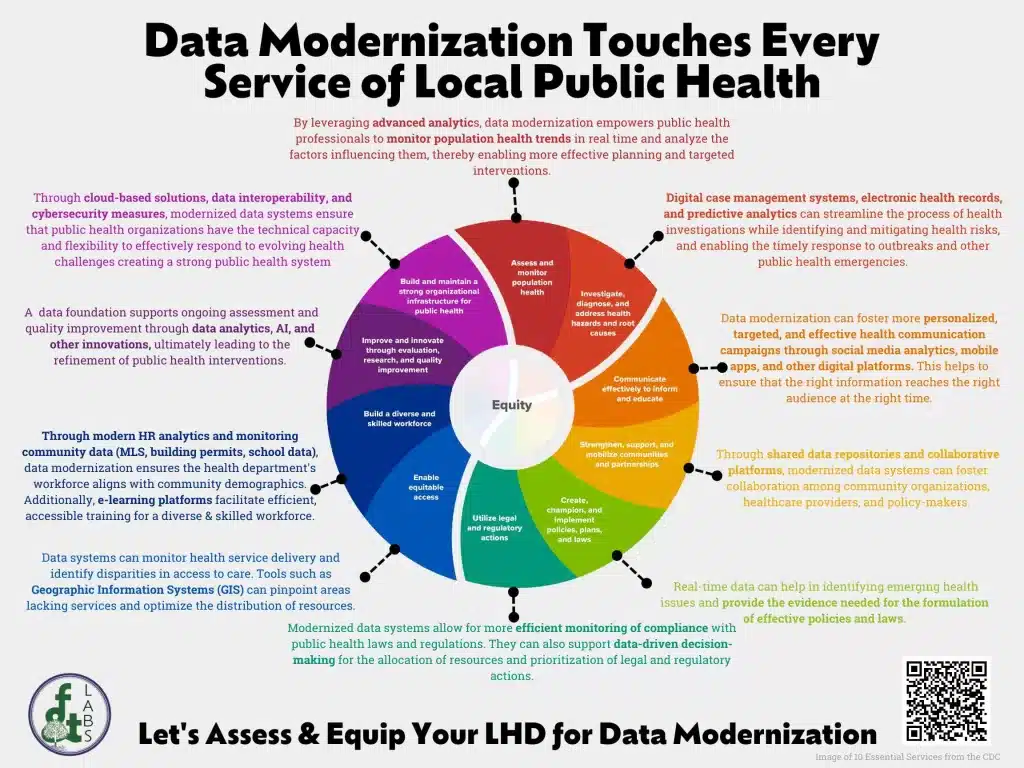Embracing Data Modernization in Public Health: A Shift Towards A More Efficient Future
The ten essential public health services are the cornerstone of health promotion, protection, and improvement. These services, each touching on a different aspect of public health, are undergoing a pivotal transformation thanks to data modernization. This transformation is not confined to a singular service; rather, it infiltrates every facet of public health, redefining how we assess health statuses, manage health risks, educate communities, and more.
Data modernization, integrating digital technologies, advanced analytics, and data-driven insights, enhances public health initiatives’ efficiency and efficacy. It is reshaping our health landscape into one that is resilient, agile, and capable of making quick, precise actions. Backed by robust evidence, efficient communication channels, and optimized resources, data modernization enables us to face the health challenges of the 21st century with a more strategic, targeted approach.
In this blog post, we delve into the significant impact of data modernization on each of the ten essential services of public health. We will illustrate how this groundbreaking shift is revolutionizing our approach to public health, paving the way for improved health outcomes, increased resilience, and innovative solutions to the pressing health challenges of our time.
Table of Contents
Harnessing Data Modernization in Public Health Services
Public health operations span a broad range of activities, all pivotal to the health and well-being of communities worldwide. To move the work of public health, data modernization is necessary. Data Modernization isn’t simply about transitioning from paper records to electronic databases; it’s about creating an interconnected, agile, and robust health system that can respond effectively to diverse public health challenges. Data modernization in public health ranges from the data modernization initiative (DMI) from the CDC to efforts to implement EHRs and analyze outreach efforts.
Public health services can be optimized to deliver impactful results efficiently by infusing modern data technologies into everyday operations. This marks a significant shift in how we approach public health, with data modernization shaping our response to health challenges in the 21st century.
Data Modernization & The 10 Essential Services of Public Health

- Assess and monitor population health status, factors that influence health, and community needs and assets: Leveraging advanced data analytics and visualization tools, data modernization enables health departments to continuously monitor population health trends and disparities, delivering richer insights into health determinants and supporting targeted interventions.
- Investigate, diagnose, and address health problems and hazards affecting the population: Health investigations’ speed and efficiency are enhanced with data modernization. Digital case management systems, electronic health records, and predictive analytics streamline identifying and mitigating health risks, enabling timely responses to public health emergencies.
- Communicate effectively to inform and educate people about health, factors influencing it, and how to improve it: Data modernization fosters personalized, targeted, and effective health communication campaigns. Social media analytics, mobile apps, and digital platforms ensure that crucial health information reaches the right audience when needed.
- Strengthen, support, and mobilize communities and partnerships to improve health: Modernized data systems foster collaboration among various stakeholders. Shared data repositories and collaborative platforms facilitate a unified approach to addressing community health needs.
- Create, champion, and implement policies, plans, and laws that impact health: Data modernization generates real-time, evidence-based insights, informing the development and implementation of effective health policies, plans, and laws.
- Utilize legal and regulatory actions designed to improve and protect the public’s health: Modernized data systems enhance the monitoring of compliance with public health laws and regulations and support data-driven decision-making for resource allocation and prioritization of legal and regulatory actions.
- Assure an effective system that enables equitable access to the individual services and care needed to be healthy: Data modernization tools such as Geographic Information Systems (GIS) monitor health service delivery and identify disparities in care access, optimizing healthcare resource distribution and ensuring equity.
- Build and support a diverse and skilled public health workforce: Data modernization streamlines workforce training and education through e-learning platforms and digital tools. Additionally, modern HR analytics support recruiting and retaining a diverse pool of professionals.
- Improve and innovate public health functions through ongoing evaluation, research, and continuous quality improvement: Data modernization facilitates the integration of emerging technologies for ongoing assessment and quality improvement, leading to refined and more effective public health interventions.
- Build and maintain a strong organizational infrastructure for public health: Data modernization bolsters an agile and resilient public health infrastructure. With cloud-based solutions, data interoperability, and cybersecurity measures, modernized data systems ensure public health organizations are well-equipped to respond to evolving health challenges.
Embracing Data Modernization in Public Health
Data modernization, an integral driver of innovation, is revolutionizing the ten essential public health services. From monitoring population health to building a diverse workforce, every aspect is transformed, fostering a more resilient, efficient, and equitable public health landscape. Amidst the complex health challenges of the 21st century, this digital shift is not just an emerging trend but a necessary progression toward a data-driven future.
As we stand at this transformative juncture, it’s clear that our strategic interventions, collaborative efforts, and the robustness of our health infrastructures must be underpinned by the power of data. At Flourish and Thrive Labs, we are committed to guiding organizations through this pivotal transition, offering bespoke solutions tailored to your specific needs.
We invite you to connect with us to explore how we can support your journey toward a data-empowered future. For an initial assessment, consider taking our Data Modernization Assessment, designed to identify opportunities for data modernization in your organization.
Let’s embrace the future of public health together, shaping a landscape that is responsive, resilient, and ready for the challenges of tomorrow, driven by the transformative power of data modernization.

